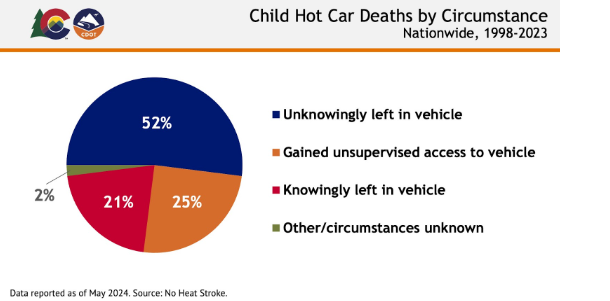New CDOT campaign brings awareness of dangers of hot cars in summer
News Release
Statewide — As Colorado heads into its hottest months of the year, the Colorado Department of Transportation is launching an awareness campaign to educate parents and caregivers about the dangers of vehicular heatstroke. The campaign urges drivers to never leave a parked vehicle unattended with children, older individuals and people with disabilities inside.
Heatstroke can happen inside vehicles with outdoor temperatures as low as 57 degrees. But at higher temperatures the risk is far greater as the temperature inside parked vehicles can approach 100 degrees in a matter of minutes. Last summer, there were 134 days over 80 degrees in Grand Junction, 100 days over 80 degrees in Denver, 96 days over 80 degrees in Fort Collins, and 89 days over 80 degrees in Colorado Springs.

Above: Pie chart showing the circumstances leading to child hot car deaths nationwide from 1998 to 2023. The data is as follows: Children unknowingly left in vehicle (52%); Gained unsupervised access to vehicle (25%); Knowingly left in vehicle (21%); and Other/circumstances unknown (2%). Graph linked here for download.
Over the last 25 years in Colorado, vehicular heatstroke has resulted in the death of seven children, but with zero reported deaths over the past decade.
Children knowingly left in cars by their caregivers account for 21% of vehicular heatstroke fatalities nationwide.
“Running inside for a quick errand does not justify leaving someone unsupervised in a vehicle,” said CDOT’s Office of Transportation Safety Director Darrell Lingk. “Time away from your vehicle can be unpredictable. Short errands can quickly turn into long lines or unforeseen delays. Parking in the shade or cracking a window will not prevent the interior of a car from becoming dangerously hot.”
Eighty percent of the total heat rise inside a vehicle occurs in the first 30 minutes, when temperatures can exceed 150 degrees, according to NoHeatStroke.org. A child’s body temperature rises three to five times faster than adults, and older individuals are also more sensitive to heat.
Additionally, people with disabilities are at a higher risk of heatstroke if they are left unattended in a hot car, as they may not be able to exit on their own or communicate their needs to a caregiver. Is essential for bystanders to provide help or call 911 if they see anyone inside a hot car who appears flushed, distressed or dehydrated.
Many people may question how tragedies like this occur, but mistakes can happen. Over half (52%) of vehicular heatstroke deaths in children occur because they were left in a vehicle by mistake. Whether it is a minor distraction or a change in one’s routine, all it takes is one moment of going on “autopilot” for a driver to leave an unattended passenger, especially if they are in the backseat. CDOT recommends leaving a passenger’s belongings, such as a toy or stuffed animal, in the front seat or entering your passenger’s destination in your GPS as a reminder.
“The best way to protect the most vulnerable passengers from vehicular heatstroke injury is to put a system in place to double-check the back seat, or ‘Look Before you Lock’ every time,” said Britney Lombard, CPST-I, Injury Prevention Manager, Children’s Hospital Colorado. “It’s always worth the extra few seconds to ensure the back seat is clear.”
Everyone must take precautions to keep the state’s hot car deaths at zero, not just parents and caregivers. According to NHTSA, over 25% of pediatric vehicular heatstroke deaths occur when a child gains access to an unlocked car and gets trapped. It is vital for anyone with a vehicle to lock their car doors so children and other vulnerable individuals cannot gain access to an unsupervised vehicle. Even if you don't have a child of your own, a child in your neighborhood could get into your unlocked vehicle. If a child is missing, quickly check all vehicles, including the trunk.
If you notice an unattended passenger in a hot car, act immediately and call 911. In 2017, Colorado passed HB17-1179, which provides Coloradans immunity from civil and criminal liability for a person who forcibly enters a locked vehicle to provide aid to an at-risk person or animal.
Learn more about the circumstances leading to hot car injuries and deaths and how you can prevent tragedies like these from happening at https://www.nhtsa.gov/campaign/heatstroke.
